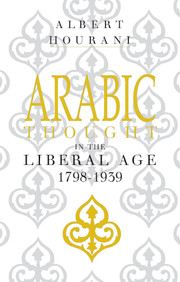Book contents
- Frontmatter
- Contents
- Preface to the 1983 reissue
- Note on Transliteration and References
- I THE ISLAMIC STATE
- II THE OTTOMAN EMPIRE
- III FIRST VIEWS OF EUROPE
- IV THE FIRST GENERATION: TAHTAWI, KHAYR AL-DIN, AND BUSTANI
- V JAMAL AL-DIN AL-AFGHANI
- VI MUHAMMAD ‘ABDUH
- VII ‘ABDUH'S EGYPTIAN DISCIPLES: ISLAM AND MODERN CIVILIZATION
- VIII EGYPTIAN NATIONALISM
- IX RASHID RIDA
- X CHRISTIAN SECULARISTS: SHUMAYYIL AND ANTUN
- XI ARAB NATIONALISM
- XII TAHA HUSAYN
- XIII EPILOGUE: PAST AND FUTURE
- Select Bibliography
- Index
- Frontmatter
- Contents
- Preface to the 1983 reissue
- Note on Transliteration and References
- I THE ISLAMIC STATE
- II THE OTTOMAN EMPIRE
- III FIRST VIEWS OF EUROPE
- IV THE FIRST GENERATION: TAHTAWI, KHAYR AL-DIN, AND BUSTANI
- V JAMAL AL-DIN AL-AFGHANI
- VI MUHAMMAD ‘ABDUH
- VII ‘ABDUH'S EGYPTIAN DISCIPLES: ISLAM AND MODERN CIVILIZATION
- VIII EGYPTIAN NATIONALISM
- IX RASHID RIDA
- X CHRISTIAN SECULARISTS: SHUMAYYIL AND ANTUN
- XI ARAB NATIONALISM
- XII TAHA HUSAYN
- XIII EPILOGUE: PAST AND FUTURE
- Select Bibliography
- Index
Summary
More conscious of their language than any people in the world, seeing it not only as the greatest of their arts but also as their common good, most Arabs, if asked to define what they meant by ‘the Arab nation’, would begin by saying that it included all those who spoke the Arabic language. But this would only be the first step, and it would carry them no more than one step farther to say it included all who claimed a link with the nomadic tribes of Arabia, whether by descent, by affiliation or by appropriation (through the medium of language and literature) of their ideal of human excellence and standards of beauty. A full definition would include also a reference to a historic process: to a certain episode in history in which the Arabs played a leading part, which was important not only for them but for the whole world, and in virtue of which indeed they could claim to have been something in human history.
The process opened with the preaching by Muhammad, an Arab of the tribe of Quraysh, of a message which he claimed to have been entrusted to him by God through the medium of the Archangel Gabriel, and which, to the minds of his followers, is so important as to have altered the nature of history. In his preaching Muhammad called on men to repent before it was too late and try to do what was pleasing to God, and defined also those beliefs and acts which God has commanded.
- Type
- Chapter
- Information
- Arabic Thought in the Liberal Age 1798–1939 , pp. 1 - 24Publisher: Cambridge University PressPrint publication year: 1983

